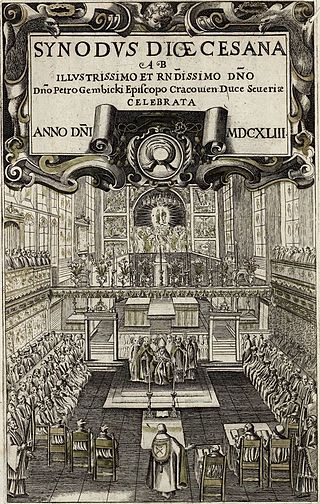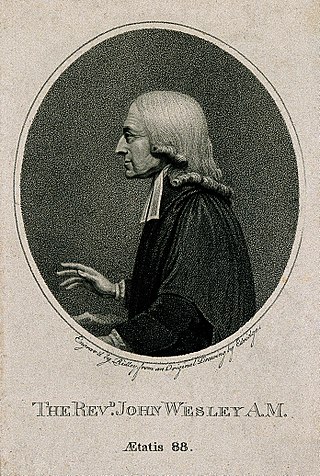
A synod is a council of a Christian denomination, usually convened to decide an issue of doctrine, administration or application. The word synod comes from the Ancient Greek σύνοδος 'assembly, meeting'; the term is analogous with the Latin word concilium'council'. Originally, synods were meetings of bishops, and the word is still used in that sense in Catholicism, Oriental Orthodoxy and Eastern Orthodoxy. In modern usage, the word often refers to the governing body of a particular church, whether its members are meeting or not. It is also sometimes used to refer to a church that is governed by a synod.

The Reverend is an honorific style given before the names of certain Christian clergy and ministers. There are sometimes differences in the way the style is used in different countries and church traditions. The Reverend is correctly called a style, but is sometimes referred to as a title, form of address, or title of respect. The style is also sometimes used by leaders in other religions such as Judaism and Buddhism.
A vicar is a representative, deputy or substitute; anyone acting "in the person of" or agent for a superior. Linguistically, vicar is cognate with the English prefix "vice", similarly meaning "deputy". It also refers to a senior priest in the Church of England. The title appears in a number of Christian ecclesiastical contexts, but also as an administrative title, or title modifier, in the Roman Empire. In addition, in the Holy Roman Empire, a local representative of the emperor, such as an archduke, could be styled "vicar".

A curate is a person who is invested with the care or cure of souls of a parish. In this sense, curate means a parish priest; but in English-speaking countries the term curate is commonly used to describe clergy who are assistants to the parish priest. The duties or office of a curate are called a curacy.
Chancellor is a title of various official positions in the governments of many countries. The original chancellors were the cancellarii of Roman courts of justice—ushers, who sat at the cancelli of a basilica, which separated the judge and counsel from the audience. A chancellor's office is called a chancellery or chancery. The word is now used in the titles of many various officers in various settings. Nowadays the term is most often used to describe:
An ecclesiastical court, also called court Christian or court spiritual, is any of certain courts having jurisdiction mainly in spiritual or religious matters. In the Middle Ages, these courts had much wider powers in many areas of Europe than before the development of nation states. They were experts in interpreting canon law, a basis of which was the Corpus Juris Civilis of Justinian, which is considered the source of the civil law legal tradition.

In several of the autocephalous Eastern Orthodox churches and Eastern Catholic Churches, the patriarch or head bishop is elected by a group of bishops called the Holy Synod. For instance, the Holy Synod is a ruling body of the Georgian Orthodox Church.

An ordinary is an officer of a church or civic authority who by reason of office has ordinary power to execute laws.
A coadjutor bishop is a bishop in the Catholic, Anglican, and (historically) Eastern Orthodox churches whose main role is to assist the diocesan bishop in the administration of the diocese. The coadjutor is a bishop himself, although he is also appointed as vicar general. The coadjutor bishop is, however, given authority beyond that ordinarily given to the vicar general, making him co-head of the diocese in all but ceremonial precedence. In modern times, the coadjutor automatically succeeds the diocesan bishop upon the latter's retirement, removal, or death.
A vicar general is the principal deputy of the bishop or archbishop of a diocese or an archdiocese for the exercise of administrative authority and possesses the title of local ordinary. As vicar of the (arch)bishop, the vicar general exercises the (arch)bishop's ordinary executive power over the entire diocese and, thus, is the highest official in a diocese or other particular church after the diocesan bishop or his equivalent in canon law.
An auxiliary bishop is a bishop assigned to assist the diocesan bishop in meeting the pastoral and administrative needs of the diocese. Auxiliary bishops can also be titular bishops of sees that no longer exist as territorial jurisdictions.
The hierarchy of the Catholic Church consists of its bishops, priests, and deacons. In the ecclesiological sense of the term, "hierarchy" strictly means the "holy ordering" of the church, the Body of Christ, so to respect the diversity of gifts and ministries necessary for genuine unity.

A dean, in an ecclesiastical context, is a cleric holding certain positions of authority within a religious hierarchy. The title is used mainly in the Catholic Church, the Anglican Communion, and many Lutheran denominations. A dean's assistant is called a sub-dean.
A diocesan chancery is the branch of administration that handles all written documents used in the official government of a Catholic or Anglican diocese.
A Surrogate, is the deputy of a bishop or an ecclesiastical judge, acting in the absence of his principal and strictly bound by the authority of the latter. It is particularly common as a term for clergy deputising for the diocesan judge in dioceses of the Church of England.
Chancellor is an ecclesiastical title used by several quite distinct officials of some Christian churches.
In the Roman Catholic Church, a judicial vicar or episcopal official is an officer of the diocese who has ordinary power to judge cases in the diocesan ecclesiastical court. Although the diocesan bishop can reserve certain cases to himself, the judicial vicar and the diocesan bishop are a single tribunal, which means that decisions of the judicial vicar cannot be appealed to the diocesan bishop but must instead be appealed to the appellate tribunal. The judicial vicar ought to be someone other than the vicar general, unless the smallness of the diocese or the limited number of cases suggest otherwise. Other judges, who may be priests, deacons, religious brothers or sisters or nuns, or laypersons, and who must have knowledge of canon law and be Catholics in good standing, assist the judicial vicar either by deciding cases on a single judge basis or by forming with him a panel over which he or one of them presides. A judicial vicar may also be assisted by adjutant judicial vicars. The judicial vicar is assisted by at least one, if not more, individuals with the title defender of the bond; they are normally priests, but do not have to be. On staff will also be notaries and secretaries, who may be priests, religious brothers or sisters or nuns, or laypersons.
According to both Catholic and Anglican canon law, a cathedral chapter is a college of clerics (chapter) formed to advise a bishop and, in the case of a vacancy of the episcopal see in some countries, to govern the diocese during the vacancy. In the Catholic Church their creation is the purview of the Pope. They can be numbered, in which case they are provided with a fixed prebend, or unnumbered, in which case the bishop indicates the number of canons according to the rents. These chapters are made up of canons and other officers, while in the Church of England chapters now include a number of lay appointees.
Moderator of the curia is a top administrative position held by a Catholic priest in a diocese under the supervision of the bishop. The moderator coordinates the exercise of the administrative duties and oversees the office holders, or curia, in the diocese. Moderator of the curia has been compared to that of a chief operating officer (COO) in a corporation. Although the office was first included in the 1983 Code of Canon Law, the concept is much older.
A rector is, in an ecclesiastical sense, a cleric who functions as an administrative leader in some Christian denominations. In contrast, a vicar is also a cleric but functions as an assistant and representative of an administrative leader.








